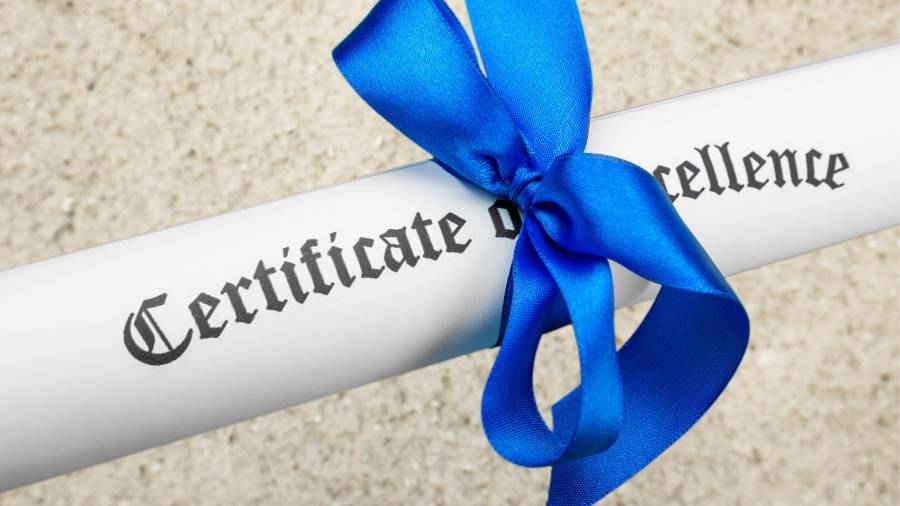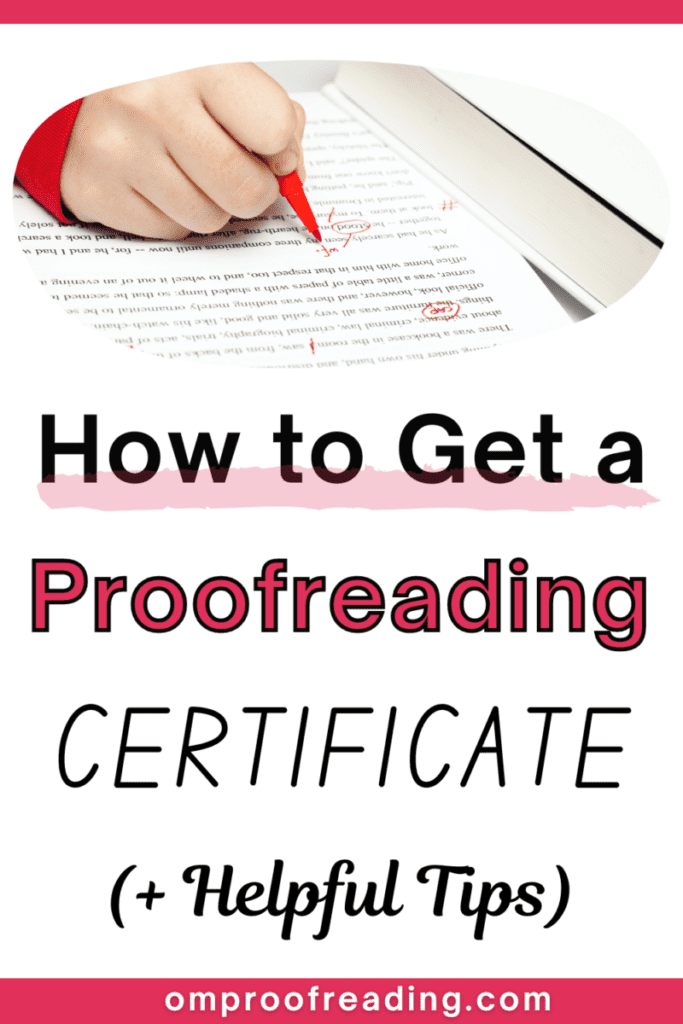This article may contain affiliate links. Please see our affiliate disclaimer in the footer menu for more information. Thank you for your support!

If you’re interested in proofreading, you probably want to know how to get a proofreading certificate. As a trained proofreader with a certificate, I can show you how to obtain one that’s worth your time and money.
You can get a certificate by completing a reputable proofreading course that gives you one (or the opportunity to earn one). Having a certificate shows potential clients that you take your job seriously because you’ve received formal training.
Let’s discover the best options for getting a proofreading certificate and determine whether it’s really necessary. Then, I’ll give you some top-notch tips for increasing your earning potential as a proofreader!
How to Get a Proofreading Certificate
If you’re serious about proofreading and want to make decent money doing it, I highly recommend taking a proofreading course. Many proofreaders have received formal training, so getting trained means you can compete with them and command decent prices from the get-go.
I penned a post about why proofreading courses provide a good ROI if you have any doubts.
Luckily, all the best proofreading classes give you a certificate of completion or the chance to earn one by passing the final exam.
Soon, we’ll look at these courses and see what it takes to get a certificate in each one.
First, let’s see exactly what we mean when we talk about getting a proofreading certificate.
What Is a Proofreading Certificate?

A proofreading certificate is a digital certificate you receive or earn from a proofreading course.
Having a certificate from a reputable program will inspire trust in your clients because it represents the skills you’ve acquired through formal training.
It’s important to note that having a proofreading certificate does not make you a certified proofreader.
Having a proofreading certificate means you’re a trained proofreader.
To become a certified proofreader, you need to get a professional certification.
Currently, the US doesn’t offer a professional certification in proofreading. The only way to get one is through Editors Canada—a well-respected editorial organization that was established in 1979.
I dedicated an article to becoming a certified proofreader if you’d like more information.
Now, let’s see if you need a certificate to be a proofreader.
Do You Need a Certificate to Proofread?
You don’t have to have a certificate to proofread, but it’s ideal.
To be competitive in the market, you need solid proofreading skills. You can acquire these skills from a proofreading course that awards you a certificate or gives you the chance to earn one.
Having a certificate is the fastest way to convey to clients that you’ve been trained for the job.
You can display the document on your profile on freelancing platforms and on your business website.
Here’s my certificate from Proofread Anywhere.
What I like about this certificate is that it’s tamper-proof and can be easily verified by scanning the QR (quick response) code. That way, potential clients know it’s legitimate.
Finally, a certificate is a great way to have a leg up in the proofreading field!
Can I Get a Proofreading Certificate from a Free Course?

You can get a proofreading certificate from a free course.
However, you won’t learn nearly enough in a free class to adequately prepare you for proofreading work.
But taking a free course is an option if you’d simply like to see if proofreading is a good fit for you.
If you get a certificate from a free course, you may be able to attract a few clients. But you probably won’t be able to keep them.
If you start proofreading before you’re ready, you risk tarnishing your reputation.
By taking a comprehensive course, you’ll gain the confidence and competence you need to succeed. And as mentioned, you’ll be able to compete with proofreaders who have received sufficient training.
Let’s look at a few courses that will properly prepare you to proofread! 😊
Courses that Offer Worthwhile Proofreading Certificates
Here are a few excellent options for training.
Cost Comparison of Proofreading Courses
| Course | Cost | Exact Price |
|---|---|---|
| General Proofreading: Theory and Practice™ (Proofread Anywhere) |
$$ | $697 for Ignite version, $797 for Ignite Plus version* |
| Becoming a Proofreader (Knowadays) |
$ | $499 |
| Essential Proofreading: Editorial Skills One (PTC) |
$ | £330 (roughly $410) + VAT |
| It’s a series of three classes: Proofreading 1: Introduction Proofreading 2: Headway Proofreading 3: Progress (CIEP) |
$$$$ | £870 for nonmembers (roughly $1,085) + VAT; discounts available for CIEP members |
* You need to purchase the Ignite Plus version of the course to have the chance to earn a certificate.
Key Points about the Proofreading Courses
Let’s check out some of the details about these classes.
Proofread Anywhere
- the only course that gives you extensive practice with using a specific style guide
- provides instruction in grammar and mechanics
- known for its supportive Facebook community for peer learning
- teaches you how to create a proofreading business and market yourself
Certificate of Completion: Yes, if you buy the Ignite Plus version of the course and pass the final exam with a score of 90% or higher.
Knowadays
- teaches you how to enhance a document’s readability and tone
- provides instruction in grammar and mechanics
- known for their helpful staff
- teaches you how to proofread typeset texts
Certificate of Completion: Yes, all students receive a certificate at the end of the course.
The Publishing Training Centre
- training provided by a well-established organization in the editing industry
- no training in grammar and mechanics
- assigns you a personal tutor for help throughout the course
- comes with a training manual to help you start a successful career
Certificate of Completion: Yes, you receive a certificate of completion from The Publications Qualification Board. The certificate indicates a grade of “pass,” “merit,” or “distinction.”
The Chartered Institute of Editing and Proofreading
- provided by a prestigious editorial organization
- no training in grammar and mechanics
- you don’t have to pay for all three classes upfront
- most comprehensive proofreading program available (provided you take all three courses in the series)
Certificate of Completion:
P1: Yes
P2: Yes, you’ll receive a certificate of completion if you complete (but do not pass) the course. If you pass the course, you’ll obtain a certificate that shows you’ve passed either with “merit” or with “distinction.” Your performance on the final assignment determines the degree to which you pass.
P3: Yes, in the same way it’s given in the P2 course.
I wrote a thorough post comparing the pros and cons of these courses if you’re interested in knowing more.
Can You Really Make Money Proofreading?

You can earn money proofreading; it’s a legitimate job. Some people even make it their career.
Proofreaders are listed on the Bureau of Labor and Statistics website as “proofreaders and copy markers” under the category of office and administrative support occupations.
The people who make the most money proofreading are those who have received adequate training and acquired the most experience.
Let’s see some ways to optimize one’s earnings from proofreading.
Five Helpful Tips to Make More Money as a Proofreader
Aside from increasing your earning potential by getting further training and experience, you can opt to take one or more of the tips from the list below:
1) Avoid platforms that take a percentage of your earnings.
When you start proofreading, you may want to use freelance platforms (e.g., Fiverr, Upwork, Freelancer) to get exposure. The platforms do the marketing for you, so your proofreading services can appear in front of many potential clients.
You can also use these marketplaces to get additional proofreading practice and earn glowing testimonials.
That’s what I did. Starting on Fiverr allowed me to boost my confidence, get more experience, and earn excellent client testimonials.
However, once you’ve gotten what you need from these platforms, it’s time to move on to higher-paying jobs. Of course, you can increase your rates on these marketplaces with time. But you’ll still have to give the platform a percentage of your earnings.
I wrote a thorough post about proofreading jobs for beginners if you’d like to see other types of jobs you can pursue.
Undoubtedly, one of the most lucrative options is to start your own proofreading business.
2) Eventually choose a proofreading niche.
Choosing a proofreading niche will allow you to become an expert in that domain. People are often willing to pay more money to hire someone who specializes in proofing the kind of content they need polished.

By niching down, you’ll find your ideal clients. These clients will connect with you because you have a common interest. When you do wonderful work for them, they’ll probably become repeat customers.
They will be the ones to leave you those targeted testimonials that allow you to continue to build authority in your domain. They’re also likely to refer you to other clients who create content in your niche.
I wrote an article called “Proofreading Niches: How and Why to Choose One” if you’d like tips on how to pick a proofreading niche.
3) Think about where you’re looking for clients.
Who are your target clients? If your ideal customers work in high-paying industries, they’ll likely have a higher budget for proofreading. It will also behoove you to find clients who recognize the value of proofreading.
Freelance platforms tend to attract clients looking to purchase services for a relatively low cost.
One way to connect with customers who have a bigger budget is by cold emailing your target clients. You can also learn how to get on the membership directory of an editorial organization in your country.
4) Consider going into one of the most profitable niches.
Proofreading scientific, medical, and technical content will allow you to earn more. Contemplate getting the necessary training to pursue one of these niches.
5) Master the art of marketing.
Making use of multiple marketing methods means you’ll make more money. 😊 For example, have business cards made for your online proofreading company, and distribute them generously.
You can also create a profile on LinkedIn and establish a Facebook business page. You can put a link to your business website on both of these.
I hope this article helped you understand how to get a proofreading certificate and provided actionable tips to guide you along your proofreading path—if that’s a path you choose to pursue.
And if you pick the proofreading path, I published an in-depth post about becoming a proofreader without any experience. Feel free to check it out!
Best wishes to you!
“Change the way you look at things and the things you look at change.”
– Wayne W. Dyer

Recent Posts
Punctuation is important because it enables us to communicate our message clearly and effectively. Without punctuation, we wouldn’t understand how units of a sentence relate to one another or how...
Although you're probably somewhat familiar with adverbs, you may be unaware of sentence adverbs. As a trained proofreader who has studied the parts of speech, I can help you understand this unique...
